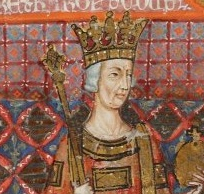Charles II of Naples
| Charles II | |
|---|---|

King Charles II from the Bible of Naples
|
|
| King of Naples | |
| Reign | 7 January 1285 – 5 May 1309 |
| Predecessor | Charles I |
| Successor | Robert |
| Born | 1254 |
| Died | 5 May 1309 (aged 55) Naples, Kingdom of Naples |
| Spouse | Mary of Hungary |
| Issue More |
Charles Martel of Anjou Saint Louis of Toulouse Robert of Naples Philip I of Taranto Raymond Berengar Peter Tempesta John of Gravina Margaret, Countess of Anjou Blanche of Anjou Eleanor of Anjou Maria of Anjou |
| House | Anjou-Sicily |
| Father | Charles I of Naples |
| Mother | Beatrice of Provence |
Charles II, called the Lame (French le Boiteux, Italian lo Zoppo; 1254 – 5 May 1309), was King of Naples, King of Albania, Prince of Salerno, Prince of Achaea, Count of Provence and Forcalquier and Count of Anjou.
He was the son of Charles I of Anjou, who had conquered the Kingdom of Naples and Sicily in the 1260s. His mother was Beatrice of Provence.
During the Sicilian Vespers, he was captured by Roger of Lauria in the naval battle at Naples in 1284. When his father died in 1285, he was still a prisoner of Peter III of Aragon.
In 1288, King Edward I of England mediated to make peace, and Charles was freed on condition that he retain Naples alone. Sicily was left to the Aragonese. Charles was also to induce his cousin Charles of Valois to renounce, for twenty thousand pounds of silver, the kingdom of Aragon, which had been given to him by Pope Martin IV to punish Peter for having invaded Sicily, but which the Valois had never effectively occupied.
Charles was then released, leaving three of his sons and sixty Provençal nobles as hostages. He promised to pay 30,000 marks and to return as a prisoner if the conditions were not fulfilled within three years. He then went to Rieti, where the new pope, Nicholas IV, absolved him from all the conditions he had sworn to observe, crowned him King of Sicily in 1289, and excommunicated King Alfonso III of Aragon. Charles of Valois, in alliance with Castile, prepared to take possession of Aragon, reopening the Aragonese Crusade. Alfonso, being hard pressed, agreed to the conditions of the Treaty of Tarascon: he had to promise to withdraw the troops he had sent to help his brother James in Sicily, renounce all rights over the island, and pay a tribute to the Holy See.
...
Wikipedia
